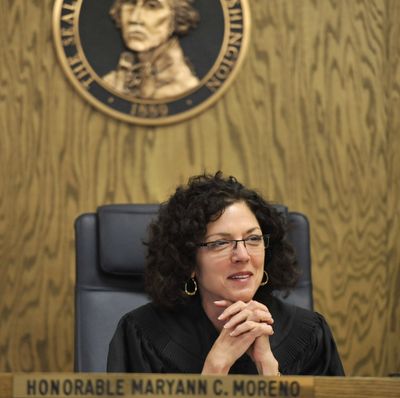Justice system changes brought results

Today, Judge Maryann Moreno steps down from the role of presiding judge in Spokane County Superior Court after overseeing dramatic changes – and improved results – in how local officials administer justice.
Presiding judges are elected by their peers and essentially handle the administration of the Superior Court judiciary, including budgeting and assigning other judges’ duties. Typically, it’s a two-year job, but Moreno has served as presiding judge for double the normal tenure because the last rotation came just as officials were implementing changes suggested by consultant David Bennett.
“We were in the middle of a huge budget crisis,” Moreno said. “Quite frankly, no one else wanted to step in because the budget was so dicey. We are also in the middle of revamping the criminal justice system. So … the other judges felt it was important to have some continuity there.”
She hands over the job to Judge Ellen Kalama Clark.
Moreno said one of her greatest sources of pride is the “early case resolution” docket, which deals with mostly minor felony cases and aims to direct people to programs that can help them or simply process them through the system faster.
“I’m so proud of that. It has been a phenomenal change,” Moreno said.
The early case resolution system stemmed from the findings of Bennett, the consultant hired by the county in 2008, who convinced representatives of all facets of the criminal justice system to plan together. At the time, Bennett said Spokane County had one of the highest rates of inmate release caused by paperwork problems that he’d ever seen. He also found that the Spokane County Jail was filling with suspects arrested simply because they failed to come to court.
One solution was the early case resolution system; another was ensuring that Spokane police and Spokane County sheriff’s detectives filed charging documents within 72 hours of a jail booking, as required by state law. Before the shift, a suspect would have his or her first appearance in Spokane County District Court and the case would be bumped up to Superior Court. However, the suspects often left the Public Safety Building with no clear idea when or where to appear in court.
When they failed to appear, they were subject to a bench warrant for their arrest.
“The jail was splitting at the seams,” Moreno said. “A lot of that was because of bench warrants because people were not appearing in court.”
The failure to file paperwork within 72 hours also meant people were walking free, and prosecutors might wait years to refile charges. By that time, the suspects had either left the area, changed their ways or advanced their criminal activity.
“We also had frustration from the victims because their cases were not being resolved,” Moreno said.
Under the new system, all first appearances start in Superior Court and every suspect leaves there with a court date. The early case resolution system means many cases are resolved much quicker than had been the case in the past.
“So basically, we are doing a lot more front-end work than we were before and we are dispensing the same justice sooner,” Moreno said.
The results have been impressive, Sheriff Ozzie Knezovich said.
“Judge Moreno was instrumental in helping reconstruct our criminal justice program,” Knezovich said. Early case resolution “was one of the big steps in improving that.”
For instance, the jail in 2007 and 2008 was averaging about 1,100 inmates systemwide, which includes the Spokane County Jail and Geiger Corrections Center.
But since the early case resolution and other programs have taken effect, the jail populations have averaged about 760 to 800 inmates, he said.
“The systems we are developing are working. They have helped keep the jail populations down,” Knezovich said. “And, they have gotten victims justice sooner. Before we started revamping the system, someone could be arrested two or three times before they ever saw a judge on their first arrest.”